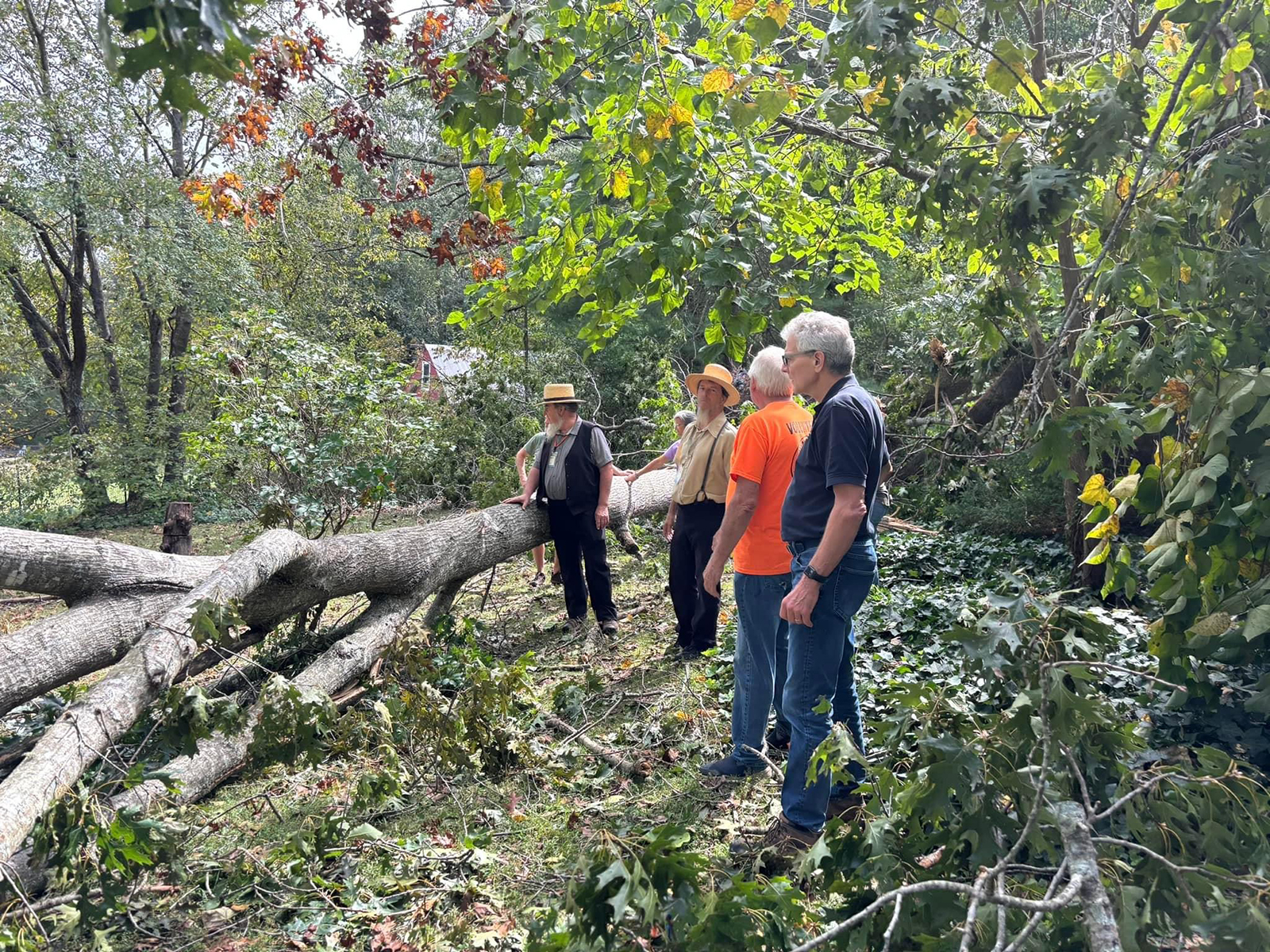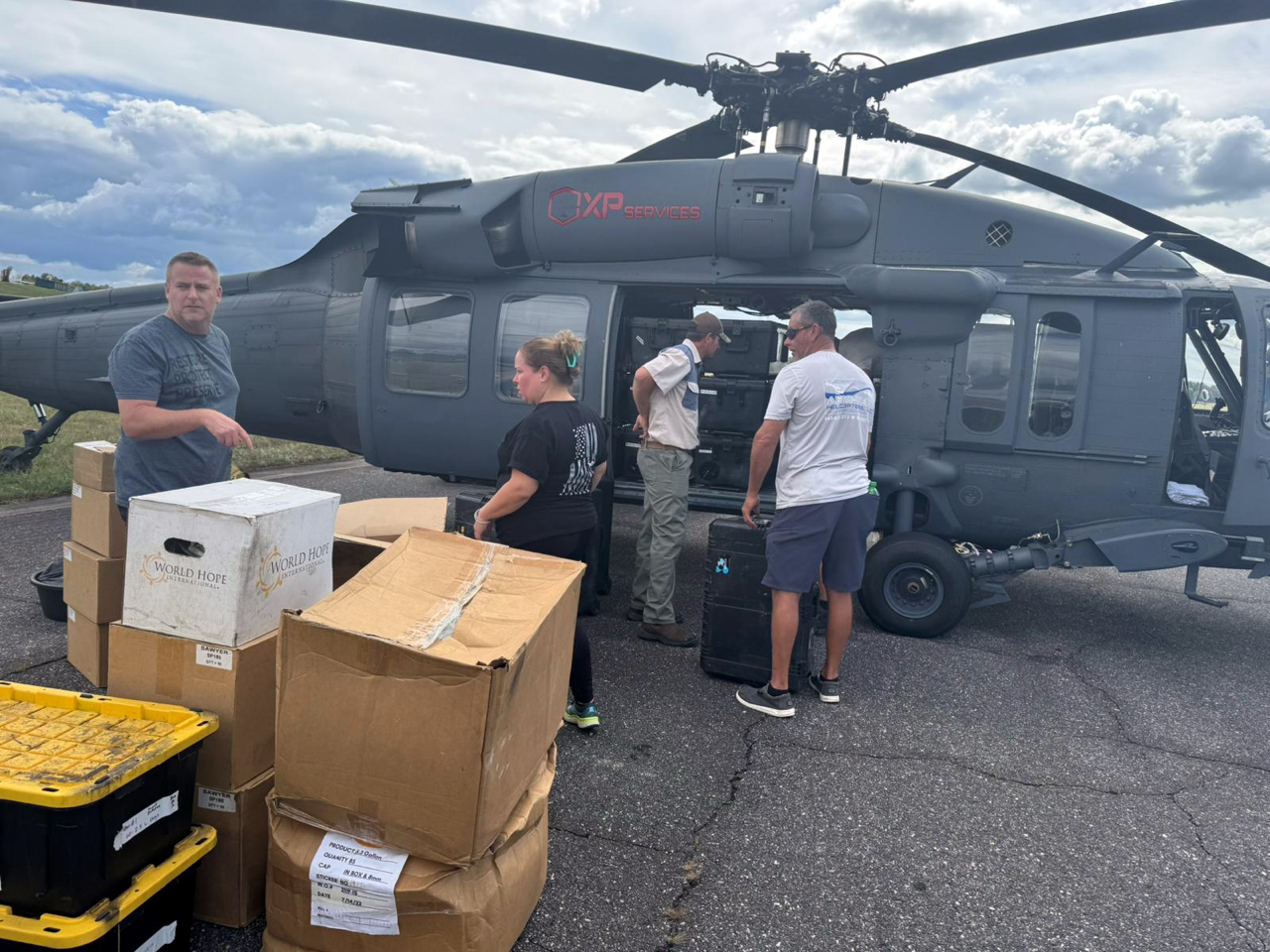(RNS) — In the days since Hurricane Helene swept through mostly rural areas of nine states, Kevin King, executive director of Mennonite Disaster Service, has been working to make plans for how to best respond, despite spotty phone service due to downed cell towers and roads and bridges that have been washed out or blocked by fallen trees.
On Tuesday (Oct. 1), King was cheered as disaster relief workers from Mennonite communities around Ohio and Pennsylvania arrived outside Asheville, North Carolina, with chainsaws and earth-moving equipment to help clear the back roads as government services focus on main thoroughfares as well as search and rescue. “It’s good to hear sounds of chainsaws bringing hope,” he said.
Six more Mennonite heavy equipment operators are expected to start work Wednesday, bringing the total volunteers on site to about 30, said King.
“It’s hard to say how long this will continue,” he said. “A disaster this complex, with roads and bridges washed out, there’s still communities that are hard to get to.”
While the Mennonite efforts are most immediately aimed at helping stranded households get out of their neighborhoods to seek supplies, King suspects that a full recovery will take years, given the scope of damage. He compares the devastation of Helene to that of Hurricane Katrina, which hit New Orleans in 2005.
The group is currently based in Fairview, North Carolina, but one of King’s tasks this week is to locate a long-term site where Mennonite disaster volunteers can be housed as they help with cleanup and rebuilding over the long haul.
“What we will be looking for is a place we can set up for three to four years,” King said.

Workers with Mennonite Disaster Service survey damage from Hurricane Helene near Asheville, N.C., Oct. 1, 2024. (Photo courtesy of Mennonite Disaster Service)
He said other groups, such as Southern Baptist Disaster Relief and Samaritan’s Purse, have also been active in North Carolina, but so far, the Mennonites have not run into them, as the devastation from the storm covers such a wide area.
Tom Beam, Southern Baptist Disaster Relief’s director for North Carolina, reported that volunteers are working in eight counties in that state.
“We have experienced, in some areas, total destruction from the storm,” Beam told Baptist Press, an official SBC publication. “We have people who are hungry. We’re trying to get meals to them as fast as we can. We’ve got people in communities that we don’t know yet if they’re OK because we can’t get to them.”
Helene left many rural communities without power — which knocked out the pumps that supply well water to homes in those communities. The storm also damaged water mains in Asheville, some of which were washed away in the storm, leading to a shortage of drinking water.
Water Mission, a South Carolina-based engineering nonprofit that helps supply clear water around the world, has staff that live in storm-affected areas. In response, the nonprofit, which has recently begun doing disaster relief in the U.S., sent six water filtration systems and 175 generators to affected areas.

Water Mission workers load supplies onto a helicopter to be delivered to a remote North Carolina mountain community after it was cut off by Hurricane Helene. (Photo courtesy of Water Mission)
“We emptied our warehouse of all the generators we had, we put safe waters systems on a truck and drove up here within 24 hours,” said Brock Kreitzburg, head of disaster response for Water Mission. “We just want to help.”
One of the systems — powered by solar panels — was helicoptered to a mountain community that’s been cut off by the storm, said Kreitzburg. Other systems, run by generators, have been set up in communities with no power and can provide water for about 5,000 people a day. The group is also using generators to help residents get water in their homes — by powering the pumps in their wells.
“We are helping with generators to get power back in the homes, which will power the pump, which will get them safe water,” he said.
The nonprofit has about 20 staff on the ground and plans to stay awhile. “We’re trying to do our part until the local government is able to restore power and water to the residents here,” said Kreitzburg.
Another faith-based nonprofit, World Vision, has been sending truckloads of water as well as muck-out kits, generators, phone chargers, blankets, coolers and blankets to Florida and North Carolina. Reed Slattery, national director for U.S. programs at World Vision, said the supplies are being distributed from local churches, such as St. John Baptist in Arden, North Carolina, just south of Asheville.
“Our goal is to get supplies to the whole region,” said Slattery, who will head to the Southeast later this week to assess additional needs.














